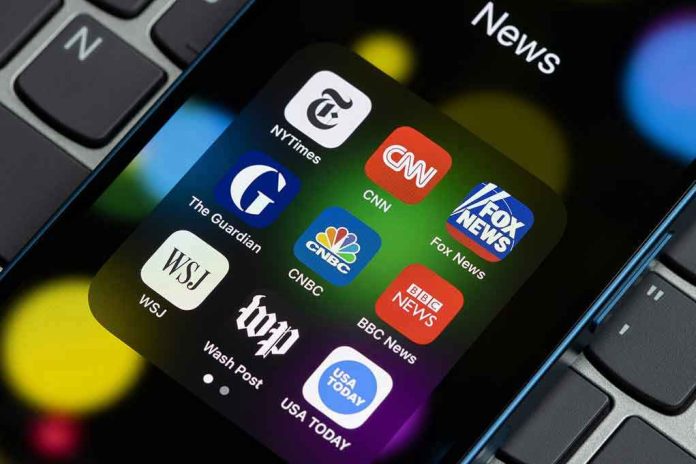
Donald Trump is not backing down, as he files a whopping $10 billion libel lawsuit against the *Wall Street Journal* and Rupert Murdoch over an alleged 2003 letter to Jeffrey Epstein.
At a Glance
- Trump files a $10 billion lawsuit against the *Wall Street Journal* for alleged defamation.
- The Journal claims Trump wrote a “bawdy” letter to Epstein in 2003.
- Trump denies the letter’s existence, calling it a “FAKE.”
- The lawsuit comes amid renewed scrutiny of Trump’s past ties with Epstein.
The Lawsuit and Its Claims
On July 18, 2025, Donald Trump took decisive legal action by filing a libel lawsuit in federal court in Miami. The suit targets the *Wall Street Journal*, its owner Rupert Murdoch, and the authors of an article claiming Trump penned a controversial letter to Jeffrey Epstein back in 2003. The alleged letter, according to the Journal, included a birthday message and a drawing of a nude woman. Trump vehemently denies the letter’s authenticity, labeling it a fabrication intended to damage his reputation.
Trump’s lawsuit seeks at least $10 billion in damages, accusing the Journal of publishing “false, defamatory, unsubstantiated, and disparaging” claims. The Journal has not retracted the story and stands by its reporting, citing sources and documentation. This high-stakes legal battle shines a spotlight on Trump’s ongoing efforts to protect his reputation against media outlets he accuses of spreading false information.
Background and Context
This lawsuit is set against the backdrop of Trump’s past relationship with Epstein, a convicted sex offender who died in jail in 2019 while awaiting trial on sex trafficking charges. Trump acknowledges knowing Epstein but insists they had a “falling out” long before Epstein’s legal issues became public. The *Wall Street Journal’s* story, published on July 17, 2025, claims the letter was part of a collection of messages assembled for Epstein’s 50th birthday. Trump’s swift legal response underscores his determination to challenge what he sees as false reporting.
The lawsuit could have significant implications for both Trump and the media industry. It highlights the tension between press freedom and the rights of individuals to protect their reputations. Trump has a history of pursuing legal action against media organizations over stories he claims are untrue, and this case could set precedents for future defamation lawsuits involving public figures and media outlets.
Potential Implications and Industry Impact
The short-term implications of this lawsuit include increased media attention on Trump’s relationship with Epstein and the veracity of the Journal’s reporting. It may also have a chilling effect on investigative journalism involving powerful public figures, as media outlets become more cautious in their reporting. The legal costs and reputational risks for both Trump and the Journal are significant, with potential financial damages if the Journal loses the case.
In the long run, the outcome of this lawsuit could influence how media outlets handle sensitive stories about public figures. It might prompt discussions about journalistic ethics, source verification, and the legal protections afforded to the press. The case could also affect public perceptions of Trump, especially if it coincides with an election cycle. Social polarization is likely to intensify as supporters and critics of Trump interpret the case through their partisan lenses.
Expert Opinions and Analysis
Legal experts note that defamation cases involving public figures are notoriously difficult to win. Plaintiffs must prove “actual malice,” meaning the publication knew the information was false or acted with reckless disregard for the truth. Media analysts point out the delicate balance between protecting press freedom and allowing individuals to defend their reputations. Some experts caution that large defamation awards could discourage investigative journalism, as media outlets might shy away from controversial stories involving powerful figures.
Supporters of Trump argue that the lawsuit is necessary to hold media accountable for false reporting. Critics, however, warn that such lawsuits can be used to intimidate journalists and suppress unfavorable coverage. The *Wall Street Journal* is generally regarded as a reputable source, but the lawsuit alleges failures in verification and substantiation. The case will likely hinge on the authenticity of the alleged letter and the Journal’s sourcing.


